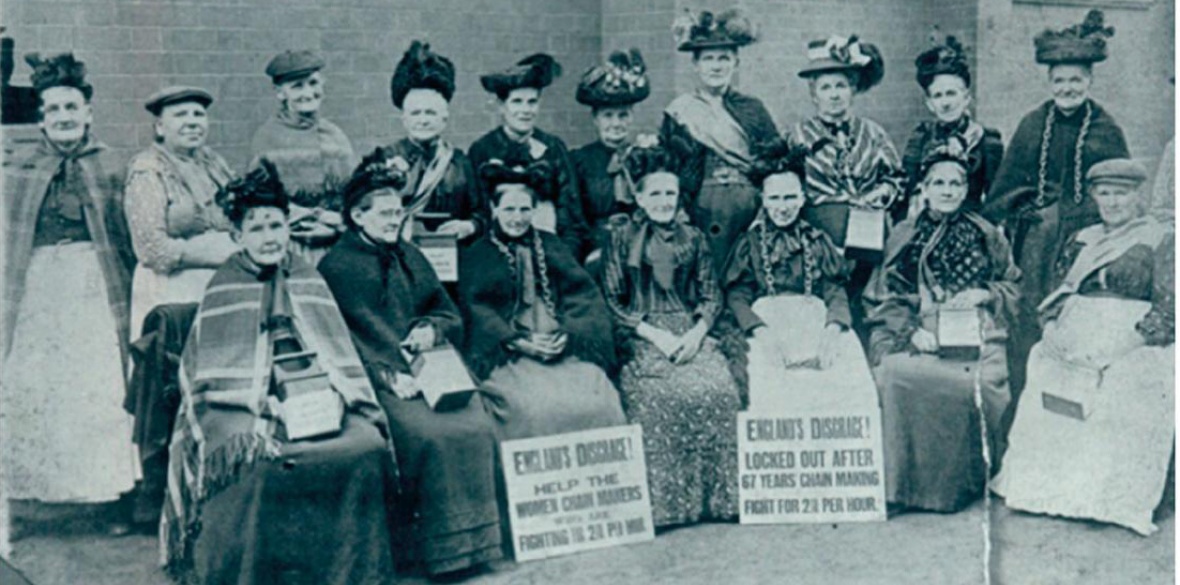This is the last article you can read this month
You can read more article this month
You can read more articles this month
Sorry your limit is up for this month
Reset on:
Please help support the Morning Star by subscribing here
IN 1906, George Cadbury, inspired by an exhibition in Germany, financed an exhibition which highlighted sweated industries.
The exhibition revealed the plight of mostly women working in dangerous conditions for a pittance of a wage.
The National Anti-Sweating League was set up following the exhibition, dedicated to the ending of low pay, setting up a minimum wage and improving working conditions.
Mary Macarthur, from the Anti Sweating League and the National Federation of Women Workers (NFWW), championed the plight of the women chainmakers after visiting Cradley Heath, describing it as like a “torture chamber of the Middle Ages.”
Using the Trades Boards Act of 1909, Mary negotiated with local employers in March 1910, securing a minimum wage for the women chainmakers.
It soon became apparent that the Act contained a loophole allowing employers to delay the pay rise, push inferior contracts and subsequently stockpile chains.
The NFWW called a meeting on August 21 1910, at which the women agreed to reject the new contracts, down hammers and go on strike.
This was a bold move for a group of lone working, uneducated, unorganised women.
Julia Varley, the first female manual worker to become a trade union leader, recruited many of the women. She wrote: “We went into the forges, talking to the women as they hammered away, awakening their consciousness to their responsibilities, appealing to their pride and their motherhood.”
Support for the strike was desperately needed. The women were poor and every penny counted.
Mary and Julia used the press to garner support for the women, draping them in chains, with signs stating “England’s Disgrace.”
A Pathe film, shown in cinemas across the country, succeeded in taking the story of the women nationwide.
Money flooded into to the strike fund providing much needed support for the striking women.
The oldest chainmaker, Patience Round, was 79 years old and had been making chain for 67 years. Attending a meeting with Mary was the first time she had left Cradley Heath, even though the meeting took place only a mile away. When interviewed she said: “These are wonderful times. I never thought that I should live to assert the rights of women. It has been the week of my life — three meetings and such beautiful talking.”
The strike lasted 10 weeks. Eventually all employers signed an agreement securing the first living wage in Britain.
The story of low paid, vulnerable, non-unionised women continues today, 110 years after the women chainmakers’ success.
The advent of the gig economy and zero-hours contracts, unsafe working conditions and low pay mean that the fight is as relevant now as it was then.
This is one of the reasons that we commemorate the strike — not only to celebrate their success and preserve our history, but also to inspire and engage with women today.
The women chainmakers’ festival is an annual event on the first Saturday of July in Cradley Heath. It is the only trade union festival to celebrate the success of women. It is organised and funded by unions in the Midlands who come together through the TUC Midlands in partnership with the Friends of the Women Chainmakers and Sandwell Council.
This year, the festival is being held virtually, welcoming a panel of women from across the trade union movement to discuss forging new links — topics will include the relevance of the chainmakers’ story today, Black Lives Matter, Rosa Luxemburg and what comes after the Covid-19 crisis.
MacArthur used the bundle of sticks story to inspire the women — one stick can be easily broken, a bundle cannot. When we stand together, we are stronger. When we speak together, we are louder. When we campaign together, we win.
Jenny Ermoyenous is a Friend of the Women Chainmakers and TUC Midlands women’s committee secretary.
The Chainmakers Festival takes place online this year on Saturday July 4, starting at 11am: www.tinyurl.com/TUCchainmakers4July.











